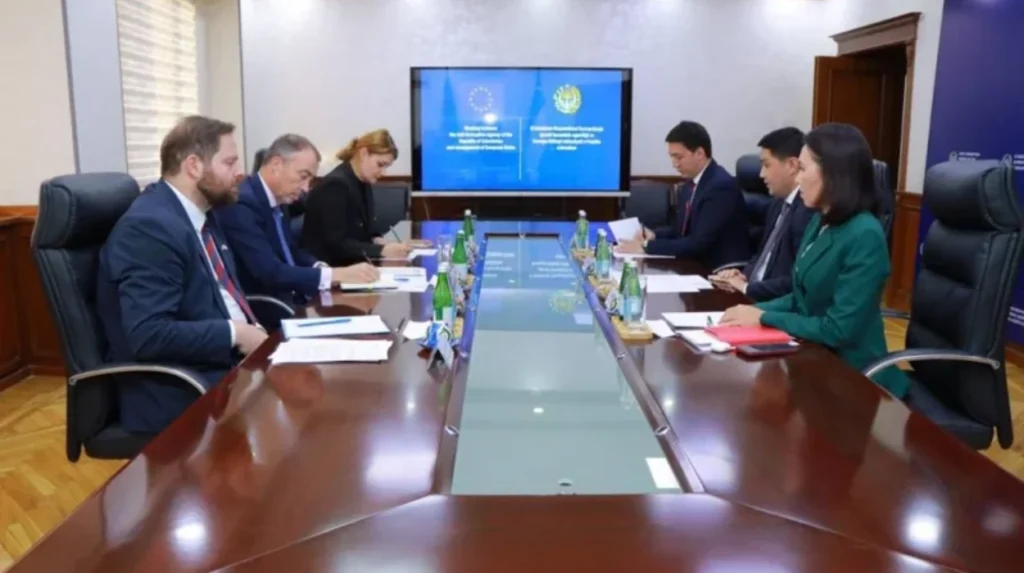The European Union and Uzbekistan have recently intensified their efforts to strengthen cooperation in combating corruption, a critical step toward enhancing transparency, governance, and sustainable development in Central Asia. This move reflects a shared commitment to tackling one of the most persistent challenges undermining economic growth and social stability in the region.
In a series of diplomatic engagements held in the past months, officials from the EU and Uzbekistan have mapped out an ambitious roadmap aimed at reinforcing anti-corruption frameworks, improving legal institutions, and promoting accountability across public sectors. This strategic partnership comes at a time when Uzbekistan is undergoing significant political and economic reforms under President Shavkat Mirziyoyev, who has prioritized the rule of law and anti-corruption initiatives since assuming office in 2016.
A Strategic Partnership Grounded in Reform
Uzbekistan’s drive to combat corruption aligns with the EU’s broader foreign policy goal of fostering stability and good governance in its neighboring regions. Both parties recognize that corruption hinders investment, deters fair competition, and perpetuates inequality, posing risks that can reverberate beyond national borders.
The EU delegation, led by Ambassador Markus Ederer, emphasized the importance of institutional cooperation, stating,
“Our partnership focuses on building robust systems that prevent corruption and promote transparency. Uzbekistan’s reform trajectory offers a unique opportunity for deepening ties and realizing tangible progress.”
This sentiment was echoed by Uzbekistan’s Deputy Prime Minister, Sukhrob Kholmuradov, who reaffirmed the government’s unwavering commitment to collaborative anti-corruption efforts.
“Uzbekistan values the cooperation with the European Union as a catalyst for accelerating our reforms and aligning with international standards,”
he said.
Enhancing Legal and Institutional Frameworks
The cooperation framework outlines various initiatives, including joint training for law enforcement and judicial officials, development of anti-corruption legislation, and creation of transparent public procurement systems. These measures aim to close gaps that have historically allowed corrupt practices to flourish.
A notable development under this cooperation is the establishment of an EU-backed advisory group tasked with supporting Uzbekistan’s National Agency for Corruption Prevention. This group will provide technical expertise to design monitoring mechanisms, strengthen whistleblower protections, and facilitate exchanges on best practices across the region.
Experts involved in this effort highlight that aligning Uzbekistan’s systems with European norms not only improves domestic governance but also facilitates smoother economic integration via enhanced investor confidence. Professor Elena Markova, a governance specialist, observed that
“the EU’s backing could significantly accelerate Uzbekistan’s journey toward credible accountability systems that are indispensable for sustained economic development.”
Promoting Transparency and Civic Engagement
Beyond institutional reforms, the EU-Uzbekistan cooperation prioritizes fostering transparency in public administration and enhancing civic participation. Civil society organizations and the media are crucial partners in this regard, empowered to report abuses and hold officials accountable.
The collaboration has launched awareness campaigns aimed at educating citizens on their rights and encouraging engagement in governance processes. One such campaign draws on digital platforms to reach younger populations, who play a vital role in pushing for reforms through activism and social media.
“A transparent society is one where citizens can confidently contribute to oversight,”
commented Michel Dupont, head of the EU’s rule of law delegation. He emphasized that empowering citizens and journalists forms a cornerstone of sustainable anti-corruption efforts.
Economic and Social Implications
Corruption in Uzbekistan has historically impeded the country’s potential, deterring foreign investment and skewing public resource allocation. As these reforms take root, investors have responded positively to signals of greater regulatory stability and rule-based governance.
International financial institutions, including the World Bank and IMF, have also welcomed these steps, linking further financial support to continued progress in anti-corruption. This external validation strengthens Uzbekistan’s regional standing and capacity to attract partnerships vital for infrastructure and technology development.
Socially, reducing corruption contributes to improved public services and equality. When funds are channeled effectively and transparently, citizens gain better access to healthcare, education, and safety nets—foundations for durable social cohesion.
Challenges and the Road Ahead
Despite the progress, challenges remain. Deeply ingrained practices, bureaucratic inertia, and occasional political resistance can slow the pace of reform. Observers note that continuous vigilance, independent judiciary action, and sustained international support will be necessary to maintain momentum.
Moreover, systemic change demands coordination across multiple government branches and engagement at all administrative levels, which the EU and Uzbekistan are committing to achieve through regular monitoring and joint evaluations.
As the cooperation framework enters its next phase, there is an increasing focus on digital tools for transparency, such as e-governance platforms that track public spending and procurement in real time. These innovations promise to reduce opportunities for corruption and improve efficiency.
Broader Geopolitical Context
Uzbekistan’s anti-corruption collaboration with the EU also has geopolitical implications. Situated at the crossroads of Europe and Asia, Uzbekistan’s stability and governance reforms contribute to regional security architecture, economic corridors, and strategic partnerships.
The EU’s investment in fostering the rule of law aligns with its priorities in promoting stability in Central Asia amid shifting global power dynamics and increased competition from other major actors. Strengthening governance in Uzbekistan could serve as a regional model and anchor EU influence in this strategically valuable area.
The ongoing cooperation between the European Union and Uzbekistan in combating corruption reflects a proactive and pragmatic approach to shared challenges. By combining institutional reform, civic empowerment, and international expertise, both parties aim to create a transparent governance environment conducive to sustainable development and regional stability.
As President Mirziyoyev’s administration continues to advance reforms, support from the EU reinforces Uzbekistan’s ambitions to embed rule of law and accountability at the core of its political and economic transformation. This collaboration not only addresses corruption but also strengthens the broader ties between Europe and Central Asia, setting a positive precedent for future cooperation.







